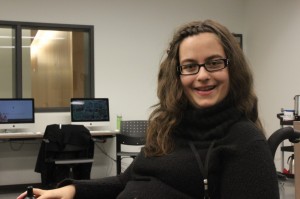
Sarah Trick shares her thoughts on the dangers of winters for the disabled. Photo by Kyle Duggan.
By Sarah Trick
For most people this season marks the start of some fun adventures, like skiing, sledding, or snowball fights.
But for people in wheelchairs like me, the first snowfall is a cause for pure dread. My motorized wheelchair, which gives me so much freedom most of the time, is completely useless in the snow.
I wasn’t too worried this past Sunday night as I made my way to an Advent carol service. In fact, I was looking forward to getting into the spirit of the season. While on the bus, I thought about what I wanted to say in my op-ed column for this week’s Times. I wanted to get across to readers how much harder winter was for some of us, how it rendered us either housebound or in peril. I’ll give lots of advice to clueless able-bodied people, I thought. It will be great.
But when the bus stopped calling out the stops and let me off far from my destination, I knew I was in trouble.
As regular OC Transpo riders know, a few years ago the transit company started an automated system for calling the stops, which has been a godsend for those of us with disabilities. Obviously it helps people with visual impairments to know where they’re going, but since wheelchairs must face the rear of the bus, it tells us too.
But last Sunday night, the automated voice went silent, leaving me adrift in an unfamiliar area of downtown. I missed my stop without even knowing it had gone by.
The bus driver was sympathetic but was no help, saying he “had to focus on driving.” After pointing me in a direction (which I later found out was the wrong one), he was off to his next stop.
The sidewalk wasn’t plowed and the snow was too much for my chair. I hadn’t gone very far before my wheels were spinning.
Undaunted, I did what any resourceful young person would do: I got out my phone and started whining on social media. This accomplished nothing except to worry my mother.
After about half an hour of cursing, I noticed a young woman walking by and called for help. She quickly called her roommates, and the four of them began an epic quest to get me back to the main road. This took up much of the rest of their evening, since they had to fish me out of several more snow banks as I kept going, and I am very grateful.
So instead of ranting about how the able-bodied just don’t get it, I will thank Samantha, Laura, Jenna, Kelly and the man whose name I didn’t get because we shared no common language. These five people took time out of their night to get someone vulnerable out of danger, and for that they should be commended.
What concerns me, though, is that it took so little to render a normally competent person helpless except for the mercy of strangers. Winter is beautiful, but it’s also cruel, and even people with no disabilities are just one slip and fall away from being incapacitated.
It is also worrisome that services we have come to rely on, like plowed sidewalks or automated recordings for bus stops, can so easily be brushed aside or ignored. What happens when the things that make our lives easier just disappear?
Looking back, I realize that there are two ways to tell this story—I could either turn it into a screed about how easy it is for the people who run public services to forget about the vulnerable, or I could talk about how the kindness of strangers restored my faith in humanity.
I say: why not both?
Winter can be a frightening time. Cars and buses break down. People fall or get stuck. Things become easier to break and harder to fix. And sometimes, public services can’t or won’t respond as quickly as we would like.
That means it’s up to us to help each other out. Don’t wait and say someone else will fix it — if you see someone struggling, lend a hand. You don’t necessarily have to rescue someone in a wheelchair, but maybe clear the sidewalk or your neighbour’s driveway, or offer to run an errand for an elderly person so that he or she doesn’t have to brave the weather. One day it could be you who is stuck and needs help to get out.
Let’s all be kind to one another. It’s cold out there.
